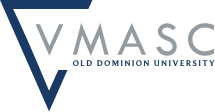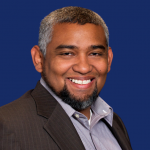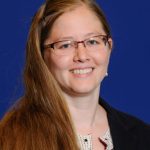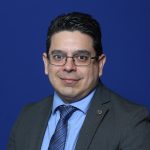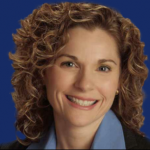Dr. Krzysztof Rechowicz
Research Associate Professor
757 686 6203 | krechowi@odu.edu
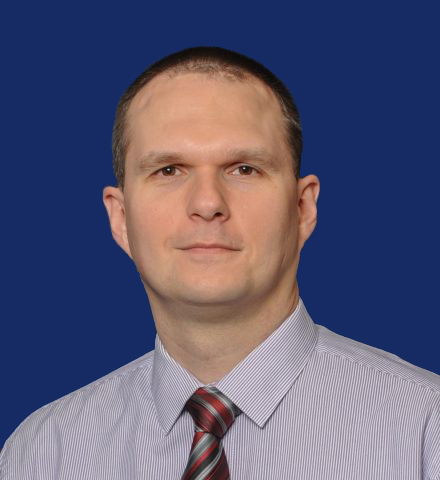
RESEARCH FIELD OF EXPERTISE & RESEARCH INTERESTS
Digital Senses, Accessible And Inclusive Interfaces, VR/XR-Based Training
SHORT BIOGRAPHY
My research experience and passion for leveraging technology to enable people of all abilities to live, work, and learn better make me well suited to achieve the goals of the proposed project. I have an interdisciplinary background with an M.S. in Mechanics and Machine Construction from the Warsaw University of Technology and a Ph.D. in Modeling and Simulation Engineering from Old Dominion University. The large portion of my academic career focused on building virtual reality-based simulators and decision support systems in application to medicine and manufacturing.
I worked with surgeons from the Children’s Hospital of the King’s Daughters in Norfolk, VA, to design and develop a prototype of the Nuss procedure simulator. This collaboration resulted in a variety of software and surgical tools, improving training, planning, post-surgical assessment, and the procedure itself. I utilized the acquired experience during my tenure as a researcher-in-residence at the Commonwealth Center for Advanced Manufacturing, representing Old Dominion University, where I interfaced and collaborated with 25+ industry and university members. I was involved in identifying challenges that industry members face in the advanced manufacturing domain and building collaborative research teams for industry-funded projects. I led teams comprised of students from member universities supporting projects focusing on using virtual and augmented reality, as well as computer vision, to support insight generation and process improvements.
Upon my return to VMASC, I started the Digital Senses Lab, which was driven by the observation that we are all unique. This places some people at the extremes of various spectra (sensory, cognitive, motor, etc.), which leads to their exclusion from fully experiencing the world and, in some cases, living independently. Since the exclusion mostly happens when due to mismatches between person’s abilities and interfaces, my research currently focuses on creating new or augmenting existing interfaces by applying the principles of Universal and Inclusive Design. My research naturally extends to the concept of Future Living which stems from the paradigm shifts in how we live, work, learn, and interact with one another as well as with autonomous and digital platforms.
EDUCATION
Ph.D. in Engineering M&S, 2012
Old Dominion University (ODU), Norfolk, VA
M.S. in Mechanics and Machine Construction, 2006
Warsaw University of Technology, Warsaw, Poland
PROFESSIONAL EXPERIENCE
VMASC, Research Associate Professor
Suffolk, VA
2023 - Present
VMASC, Research Assistant Professor
Suffolk, VA
2014 - 2023
Old Dominion University, Adjunct Assistant Professor
Norfolk, VA
2013 - 2017
Old Dominion University, Postdoctoral Research Associate
Norfolk, VA
2012 - 2014
Old Dominion University, Graduate Research Assistant
Norfolk, VA
2008 - 2012
REPURPOSING COMPUTATIONAL ANALYSES OF TACTICS FOR TRAINING ASSESSMENTS
This project is developing a software technology, called FOX TWO, that leverages big data analysis and learning systems to analyze large quantities of training data. The system provides the user with trend analysis and optimized future training recommendations. FOX TWO automatically performs training analysis and tracking of trainee’s skill progression from initial training through their entire career. Through a combination of currency and proficiency-based analyses, FOX TWO provides recommendations to make training more efficient and effective.
FOX TWO comes from the realization that with limited subject matter expert (SME) availability and large volumes of data generated from today’s training environments, a comprehensive and consistent trainee assessment is impractical, if not impossible. This is due to the sheer quantity of time and quality of analysis required to determine and track a trainee’s actual proficiency. This affects the SME’s ability to do long term trend analysis and select the most appropriate future training scenario to match the trainee’s needs to master mission essential skills.
To addresses these challenges, FOX TWO provides computing capabilities to analyze training data to determine how well a trainee met predetermined Measures of Performance (MOPs). Through individual training performance tracking, FOX TWO provides scenario recommendations to ensure trainees master warfighting skills as intended. Furthermore, by tracking trainees throughout their career, FOX TWO can identify when a skill is mastered and how often trainees need to practice that skill to stay proficient. Using FOX TWO, units can not only train more efficiently and effectively, but Commanders can get a better insight into a unit’s readiness to fight the enemy. FOX TWO ensures adaptability to future requirements and analysis techniques by comprising modularity, extensibility, and microservices at its core.
AUGMENTED REALITY FOR PROCESS CONTROL
In this project, a flexible augmented reality system for integrating design and process information with a worker’s physical space for environment feedback and control of manufacturing process was developed. This effort had strong focus on integration of multimodal manufacturing data from sensors with a delivery method that allows displaying information in the context of physical world.
VIRGINIA SMALLSAT DATA CONSORTIUM (VSDC)
VSDC a multi-institutional collaborative effort led by Old Dominion University and Virginia Tech, supported by the Virginia Research Innovation Fund (VRIF). In concert with partners and affiliates, VSDC builds data solutions and initiatives that will grow Virginia’s economy and improve the lives of everyday Virginians. VSDC creates and delivers accessible and collaborative tools to increase the value and impact of data-driven problem solving for societal benefit. By solidifying an ethic of data-based sharing, and by integrating with the diverse communities we serve, we can grow data-ready workforces and position Virginia-based businesses and stakeholders as real players in national and global data markets. VSDC promotes collaboration between research organizations and industry, support new business ventures, encourage the shared use of facilities, and accelerate the development of centers-of-excellence throughout the Commonwealth to capitalize on actionable data that makes a difference.
SIGNIFICANT PUBLICATIONS
K.J. Rechowicz, J.B. Shull, M. Hascall, S.Y. Diallo, K.J. O’Brian, “Internet-of-Things Devices in Support of Development of Echoic Skills Among Children with Autism Spectrum Disorder,” Journal of Applied Behavior Analysis [in review]
C. Tremmel, C. Herff, T. Sato, K.J. Rechowicz, Y. Yamani, and D. Krusienski, Estimating Cognitive Workload in an Interactive Virtual Reality Environment using EEG,” Frontiers in Human Neuroscience, vol. 13, p. 401, 2019.
K. J. Rechowicz, M. F. Obeid, S. Chemlal, and F. D. McKenzie, Simulation of the Critical Steps of the Nuss Procedure,” Computer Methods in Biomechanics and Biomedical Engineering: Imaging & Visualization, pp. 1-15, 2014.
K. J. Rechowicz, S. Y. Diallo, D. A. Knowles Ball, and J. Solomon, ”Designing Modeling and Simulation User Experiences: An Empirical Study Using Virtual Art Creation,” in Proceedings of the 2018 Winter Simulation Conference, Goethenburg, Sweden, 2018.
K. J. Rechowicz, S. Y. Diallo, H. M. Garcia, J. B. Shull, and B. Cvijetic, ”Making digital sense[s]: fundamentals,” in Proceedings of the Annual Simulation Symposium, Baltimore, Maryland, 2018.
CV/RESUME
Dr. Krzysztof Rechowicz
Research Associate Professor
757 686 6203 | krechowi@odu.edu

RESEARCH FIELD OF EXPERTISE & RESEARCH INTERESTS
Digital Senses, Accessible And Inclusive Interfaces, VR/XR-Based Training
SHORT BIOGRAPHY
My research experience and passion for leveraging technology to enable people of all abilities to live, work, and learn better make me well suited to achieve the goals of the proposed project. I have an interdisciplinary background with an M.S. in Mechanics and Machine Construction from the Warsaw University of Technology and a Ph.D. in Modeling and Simulation Engineering from Old Dominion University. The large portion of my academic career focused on building virtual reality-based simulators and decision support systems in application to medicine and manufacturing.
I worked with surgeons from the Children’s Hospital of the King’s Daughters in Norfolk, VA, to design and develop a prototype of the Nuss procedure simulator. This collaboration resulted in a variety of software and surgical tools, improving training, planning, post-surgical assessment, and the procedure itself. I utilized the acquired experience during my tenure as a researcher-in-residence at the Commonwealth Center for Advanced Manufacturing, representing Old Dominion University, where I interfaced and collaborated with 25+ industry and university members. I was involved in identifying challenges that industry members face in the advanced manufacturing domain and building collaborative research teams for industry-funded projects. I led teams comprised of students from member universities supporting projects focusing on using virtual and augmented reality, as well as computer vision, to support insight generation and process improvements.
Upon my return to VMASC, I started the Digital Senses Lab, which was driven by the observation that we are all unique. This places some people at the extremes of various spectra (sensory, cognitive, motor, etc.), which leads to their exclusion from fully experiencing the world and, in some cases, living independently. Since the exclusion mostly happens when due to mismatches between person’s abilities and interfaces, my research currently focuses on creating new or augmenting existing interfaces by applying the principles of Universal and Inclusive Design. My research naturally extends to the concept of Future Living which stems from the paradigm shifts in how we live, work, learn, and interact with one another as well as with autonomous and digital platforms.
EDUCATION
Ph.D. in Engineering M&S, 2012
Old Dominion University (ODU), Norfolk, VA
M.S. in Mechanics and Machine Construction, 2006
Warsaw University of Technology, Warsaw, Poland
PROFESSIONAL EXPERIENCE
VMASC, Research Assistant Professor
Suffolk, VA
2014 - Present
Old Dominion University, Adjunct Assistant Professor
Norfolk, VA
2013 - 2017
Old Dominion University, Postdoctoral Research Associate
Norfolk, VA
2012 - 2014
Old Dominion University, Graduate Research Assistant
Norfolk, VA
2008 - 2012
REPURPOSING COMPUTATIONAL ANALYSES OF TACTICS FOR TRAINING ASSESSMENTS
This project is developing a software technology, called FOX TWO, that leverages big data analysis and learning systems to analyze large quantities of training data. The system provides the user with trend analysis and optimized future training recommendations. FOX TWO automatically performs training analysis and tracking of trainee’s skill progression from initial training through their entire career. Through a combination of currency and proficiency-based analyses, FOX TWO provides recommendations to make training more efficient and effective.
FOX TWO comes from the realization that with limited subject matter expert (SME) availability and large volumes of data generated from today’s training environments, a comprehensive and consistent trainee assessment is impractical, if not impossible. This is due to the sheer quantity of time and quality of analysis required to determine and track a trainee’s actual proficiency. This affects the SME’s ability to do long term trend analysis and select the most appropriate future training scenario to match the trainee’s needs to master mission essential skills.
To addresses these challenges, FOX TWO provides computing capabilities to analyze training data to determine how well a trainee met predetermined Measures of Performance (MOPs). Through individual training performance tracking, FOX TWO provides scenario recommendations to ensure trainees master warfighting skills as intended. Furthermore, by tracking trainees throughout their career, FOX TWO can identify when a skill is mastered and how often trainees need to practice that skill to stay proficient. Using FOX TWO, units can not only train more efficiently and effectively, but Commanders can get a better insight into a unit’s readiness to fight the enemy. FOX TWO ensures adaptability to future requirements and analysis techniques by comprising modularity, extensibility, and microservices at its core.
AUGMENTED REALITY FOR PROCESS CONTROL
In this project, a flexible augmented reality system for integrating design and process information with a worker’s physical space for environment feedback and control of manufacturing process was developed. This effort had strong focus on integration of multimodal manufacturing data from sensors with a delivery method that allows displaying information in the context of physical world.
VIRGINIA SMALLSAT DATA CONSORTIUM (VSDC)
VSDC a multi-institutional collaborative effort led by Old Dominion University and Virginia Tech, supported by the Virginia Research Innovation Fund (VRIF). In concert with partners and affiliates, VSDC builds data solutions and initiatives that will grow Virginia’s economy and improve the lives of everyday Virginians. VSDC creates and delivers accessible and collaborative tools to increase the value and impact of data-driven problem solving for societal benefit. By solidifying an ethic of data-based sharing, and by integrating with the diverse communities we serve, we can grow data-ready workforces and position Virginia-based businesses and stakeholders as real players in national and global data markets. VSDC promotes collaboration between research organizations and industry, support new business ventures, encourage the shared use of facilities, and accelerate the development of centers-of-excellence throughout the Commonwealth to capitalize on actionable data that makes a difference.
SIGNIFICANT PUBLICATIONS
K.J. Rechowicz, J.B. Shull, M. Hascall, S.Y. Diallo, K.J. O’Brian, “Internet-of-Things Devices in Support of Development of Echoic Skills Among Children with Autism Spectrum Disorder,” Journal of Applied Behavior Analysis [in review]
C. Tremmel, C. Herff, T. Sato, K.J. Rechowicz, Y. Yamani, and D. Krusienski, Estimating Cognitive Workload in an Interactive Virtual Reality Environment using EEG,” Frontiers in Human Neuroscience, vol. 13, p. 401, 2019.
K. J. Rechowicz, M. F. Obeid, S. Chemlal, and F. D. McKenzie, Simulation of the Critical Steps of the Nuss Procedure,” Computer Methods in Biomechanics and Biomedical Engineering: Imaging & Visualization, pp. 1-15, 2014.
K. J. Rechowicz, S. Y. Diallo, D. A. Knowles Ball, and J. Solomon, ”Designing Modeling and Simulation User Experiences: An Empirical Study Using Virtual Art Creation,” in Proceedings of the 2018 Winter Simulation Conference, Goethenburg, Sweden, 2018.
K. J. Rechowicz, S. Y. Diallo, H. M. Garcia, J. B. Shull, and B. Cvijetic, ”Making digital sense[s]: fundamentals,” in Proceedings of the Annual Simulation Symposium, Baltimore, Maryland, 2018.
CV/RESUME
